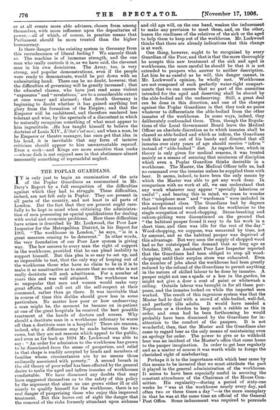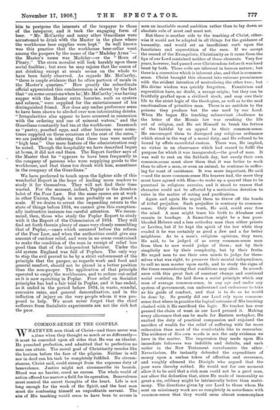THE POPLAR GUARDIANS.
IT is only just to begin an examination of the acts of the Poplar Guardians as summarised in Mr. Davy's Report by a full recognition of the difficulties against which they had to struggle. These difficulties, indeed, are not felt only in Poplar. They are present in all parts of the country, and not least in all parts of London. But the fact that they are present ought care- fully to be kept in mind when criticising the administra- tion of men possessing no special qualifications for dealing with social and economic problems. How these difficulties have arisen is described by Mr. Lockwood, the Poor Law Inspector for the Metropolitan District, in his Report for 1905. " The workhouse in London," he says, " is in a great measure ceasing to be deterrent." In other words, the very foundation of our Poor Law system is giving way. The law secures to every man the right of support in the workhouse, provided that he can plead inability to support himself. But this plea is so easy to • set up, and so impossible to test, that the only way of keeping out of the workhouse those who have no claim to be in it is to make it so unattractive as to ensure that no one who is not really destitute will seek admittance. For a number of years this end was well attained. The workhouse was so unpopular that men and women would make very great efforts, and call out all the self-respect at their command, rather than go there. It was inevitable that in course of time this dislike should grow less in some particulars. No matter how poor or how undeserving a man might be, the moment he became an in-patient at one of the great hospitals he received the best possible treatment at the hands of doctors and nurses. Why should a destitute man in a workhouse infirmary be worse off than a destitute man in a hospital ? There are reasons, indeed, why a difference may be made between the two cases, but they are not reasons which appeal to the public, and even as far back as 1894 Mr. Lockwood was able to say : "An order for admission to the workhouse has grown to be dissociated from the sense of pauperism, and relief in that shape is readily accepted by heads and members of families whose circumstances are by no means those ordinarily associated with poverty." A second breach in the old theory of poor relief has been effected by the general desire to make the aged and infirm inmates of workhouses comfortable. We have dismissed any doubts that may have suggested themselves as to the safety of this policy by the argument that since no one grows either ill or old merely to qualify himself for the workhouse, there is no real danger of pauperising those who enjoy this improved treatment. But this leaves out of sight the danger that the removal of the risks formerly attendant upon sickness and old age will, on the one band, weaken the inducement to make any provision to meet them, and, on the other, lessen the readiness of the relatives of the sick or the aged to help them to keep out of the workhouse. Mr. Lockwood thinks that there are already indications that this change is at work.
One thing, however, ought to be recognised by every Guardian of the Poor, and that is that the more thoroughly he accepts this new treatment of the sick and aged in workhouses, the more careful he should be that it is not extended to paupers who answer to neither description. Let him be as careful as he will, this danger cannot, in Mr. Lockwood's opinion, be wholly met. Workhouses are not composed of such perfectly water-tight compart- ments that we can ensure that no part of the amenities intended for the aged and deserving shall be shared by the able-bodied and the undeserving. Still, a great deal can be done in this direction, and one of the charges against the Poplar Guardians is. that they took no pains whatever to differentiate the able-bodied from the other inmates of the workhouse. In some ways, indeed, they deliberately confounded them. Thus, though the Regula- tions of the Local Government Board leave the Medical Officer an absolute discretion as to which inmates shall be classed as able-bodied and which as infirm, the Guardians took this matter out of his hands and directed that all inmates over sixty years of age should receive " infirm " instead of " able-bodied" diet. As regards beer, which in theory is only given for medical reasons, it was treated mainly as a means of securing that minimum of discipline which even a Poplar Guardian thinks desirable in a workhouse. The Master, the Medical Officer tells us, had no command over the inmates unless he supplied them with beer. It seems, indeed, to have been the only means by which the Master was able to get any work done. In comparison with no work at all, we can understand that any work whatever may appear " specially laborious or useful " ; and bearing this in mind, we cease to wonder that " telephone man" and " wardsman " were included in this exceptional class. The Guardians bad by degrees reduced the manual work done in the workhouse to the single occupation of wood-chopping. Stone-breaking and oakum-picking were discontinued on the ground that " the habitual pauper found it easy to do his work in a short time, and then was idle for the rest of the day." Wood-chopping, we suppose, was measured by time, not by amount, and so the habitual pauper was deprived of this advantage. But very soon the supply of chopped wood had so far outstripped the demand that as long ago as October, 1903, an Assistant Poor Law Inspector reported that the Guardians had been obliged to stop all wood- chopping until their surplus store was exhausted. Even the number of jobs about the workhouse had been greatly reduced by the refusal of the Guardians to permit anything in the nature of skilled labour to be done by inmates. A pauper might not use a spade or a hoe in the garden, be might not give a door a coat of paint or whitewash a ceiling. Outside labour was brought in for all these pur- poses, and the inmates looked on while the imported men worked. The result of this ingenious system was that the Master bad to deal with a crowd of able-bodied, well-fed, and perfectly idle adults. It would have needed a Napoleon or a Gordon to keep such a rabble as this in order, and even had he been forthcoming he would probably have been dismissed by the Guardians for in- attention to the comfort of the paupers. It is not wonderful, then, that the Master and the Guardians also came to regard beer as the only means of maintaining even an apology for order. The power to give or to withhold. beer was an incident of the Master's office that came home to the pauper imagination. In order to get beer regularly and as a matter of course it was worth while to forego the cherished right of misbehaving.
Perhaps it is to the importance with which beer came by this means to be invested that we must attribute the part it played in the general administration of the workhouse. It seems to have been especially useful in securing the constant attendance of the Chairman of the House Com- mittee. His regularity—during a period of sixty-one weeks he " was at the workhouse nearly every day, and often two or three times a day "—is the more exemplary in that he was at the same time an official of the General Post Office. Some inducement was required to persuade him to postpone the interests of the taxpayer to those of the ratepayer, and it took the engaging form of beer. " Mr. McCarthy and many other Guardians were accustomed to drink with the Master in the place where the workhouse beer supplies were kept." So well known was this practice that the workhouse beer-cellar went among the paupers by the name of the " Madeley Arms "- the Master's name was Madeley—or the " Horn of Plenty." The stern moralist will look harshly upon these social frailties ; but even he may rejoice that the canon of not drinking except at meals seems on the whole to have been fairly observed. As regards Mr. McCarthy, " there is ample evidence that he often partook of meals in the Master's quarters." How greatly the subordinate official appreciated this condescension is shown by the fact that " on some occasions when he [Mr. McCarthy] was having supper with the Master extra luxuries, such as oysters and salmon," were supplied for the entertainment of his distinguished friend. Nor does any undue preference seem to have been shown to alcohol over non-intoxicating drinks. " Irregularities also appear to have occurred in connexion with the ordering and use of mineral waters," and the Guardians constantly had tea at the workhouse. Inasmuch as " pastry, poached eggs, and other luxuries were some- times supplied on these occasions at the cost of the rates," we are justified in inferring that these teas were usually " high teas." One more feature of the administration may be noted. Though the hospitality we have described began at home, it did not end there. The Report further says of the Master that he " appears to have been frequently in the company of persons who were supplying goods to the workhouse, and that these too drank with him, sometimes in the company of the Guardians."
We have preferred to touch upon the lighter side of this wonderful Report in the hope of leading more readers to study it for themselves. They will not find their time wasted. For the moment, indeed, Poplar is the drunken helot of the Poor Law. But the same causes are at work in other Unions, though in none probably on so grand a scale. If we desire to arrest the impending return to the state of things before 1834, we cannot give this exception- ally instructive instance too careful attention. We recom- mend, then, those who study the Poplar Report to study with it the Report of the Commission of 1834. They will find set forth therein plenty of cases very closely resembling that of Poplar,—cases which occurred before the reform of the Poor Law, and when the authorities could give any amount of outdoor relief, and were in no sense constrained to make the condition of the man in receipt of relief less good than that of the independent labourer. Under the old system England was full of Poplars. The only way to stop the evil proved to be by a strict enforcement of the principle that the pauper, as regards work and food and general comfort, should not be placed in a better position than the non-pauper. The application of that principle operated to empty the workhouses, and to reduce out-relief as it is now operating in Poplar. Poor relief on Socialist principles has had a fair trial in Poplar, and it has ended, as it ended in the period before 1834, in waste, scandal, excessive rates, and general demoralisation, and in the infliction of injury on the very people whom it was pro- posed to help. We must never forget that the chief sufferers from Socialistic experiments are not the rich but the poor.



























































 Previous page
Previous page